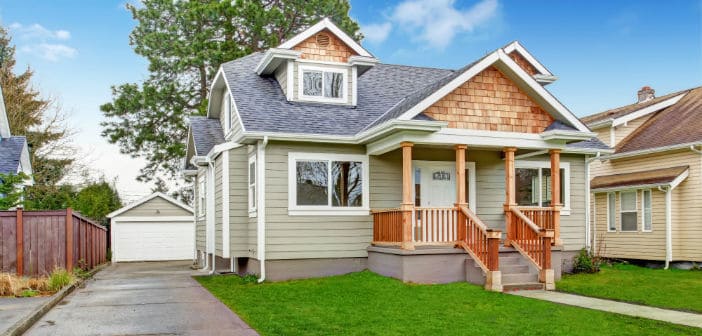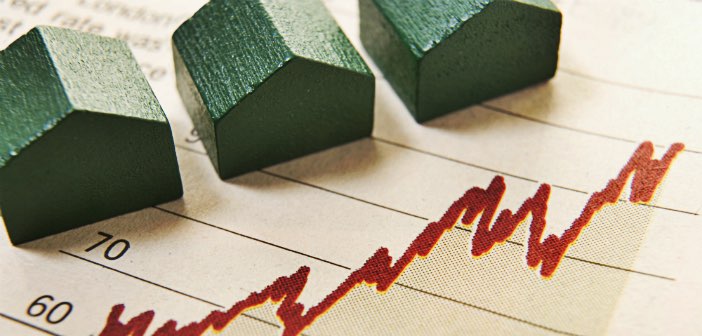Have you ever noticed that when friends, family, or acquaintances buy their first homes, everyone tends to congratulate them? Have you ever been to a housewarming party and noticed the sheer joy in the faces of new buyers and the pride in their voices as they brag about the deal they got and the great features of their new neighborhood?
While I would never steal the thunder from these folks in their moment of “glory,” when I find myself at housewarming parties, I often wonder quietly to myself just what on EARTH this person is thinking!
The problem that I see in far too many of these first-time purchases is that the purchaser is setting themselves up for a very unnecessary painful financial future in exchange for short-term enjoyment of the real estate that they just purchased. I always wonder whether the purchaser understands the incredible, long-lasting financial consequences of their decision or if they just haven’t even considered just how devastating their choice may be in future years.
One key problem for folks seems to be that most people buy a first home thinking that they are making an investment. In reality, a home is not an investment in most cases. It is possible to turn a home into an investment, but practically speaking, if you are buying a home that you intend to occupy yourself — that you do not intend to improve or rent out — you are not acquiring an asset. You are acquiring a liability.
With this article, I hope to leave you, the reader, with the understanding that if you buy like the typical American family, you are likely sacrificing quite a bit of day-to-day decision-making power for the ensuing 5-10 years and foregoing untold opportunity in return for your “investment.”

It Doesn’t Have to Be That Way
In this article, we are going to discuss five ways that average Americans can buy their first homes — and the profound short and long-term financial consequences of those decisions. I challenge you to see if any of these statements ring true for you or folks that you know. I’d like you to use this article to help you understand the traps that so many good, smart, hardworking people fall into.
Remember, the situations I describe below are options that a typical American first-time home buyer can expect to have. In order to qualify financially as a first-time buyer, one typically will have to have a reasonable history of making payments, thus building credit. You will typically have significant savings, usually into the tens of thousands of dollars. The point is that these choices confront the average American who has a been financially responsible for the last few years.
With that, let’s get to the five ways that ordinary Americans can purchase properties for the first time.
5 Ways to Buy a First Property (& the Financial Consequences of Those Decisions)
#1: Buying the biggest, nicest luxury property one can possibly afford in the nicest possible school district or coolest part of town, stretching one’s financial limits in the process
Sally was a 27-year-old hard-working Millennial with an excellent job, making $80K per year. She used her life savings of $25,000 towards the down payment on a $425,000 luxury condo overlooking the city, right next to the big sports stadium. Sally thought this was a good investment because “condos in that part of town are the most in demand in the city — they always go up!” She had a killer housewarming party, inviting all her friends over.
Three years in, Sally finds that prices have only risen modestly and that she can no longer afford to keep up the fancy vacations she took as a renter, to regularly upgrade her car every year or two, and to go out to her favorite restaurants with the frequency that she was used to. Rising HOA fees, coupled with the already expensive mortgage, force her to continually sacrifice in other areas of her life. Meanwhile, another new condo complex was built recently with far more in-demand condos than hers. Friends no longer want to go to her place to hang out — and instead go to another friend’s condo in the newer, fancier building.
——–
Tom and Nancy were a 34-year-old couple with an infant son and a daughter on the way. Combined, they had a household income of about $130,000 and purchased a $650,000 home in the best school district in their city. They used their entire life savings, outside of their retirement funds, towards the down payment, and they borrowed a little money from Nancy’s father to help cover the rest. They believed that they were planning for their children’s futures. They believed this was a good investment because “the schools are so good, and we’ve got such a great view.”
A few years later, Tom and Nancy are finally back to being able to save up some money. It’s been a tough few years. They could never seem to save money, maintaining their property was much more work than they thought, and prices hadn’t risen as much as they thought they would. They are stuck for at least a couple more years in their house. Tom recently was offered a job that paid significantly more in a city much closer to Tom and Nancy’s parents. Unfortunately, Nancy can’t get a job that pays anywhere near her current salary in the new city, so Tom has to decline the new job. It’s a shame, too, because Nancy would have liked to stay home with the children, but right now they just can’t afford to move because they can’t sell the house. Who knows if another opportunity like that is going to come Tom’s way?
——–
This is the dream, right? Work hard in school, get a good job, get married, save up, and then you can buy the house with the white picket fence on top of the hill and send your kids to the best schools that your region has to offer!
Unfortunately, this is also the quickest way into the Middle Class American Dreams Graveyard. This type of first-time home purchase is often accompanied with financial choices, such as:
- Putting ALL of one’s savings outside of retirement into the home
- Borrowing for the down payment
- Using over a third of one’s after-tax take home pay to cover the mortgage
This type of person espouses benefits to buying this type of property, like:
- Getting to live in the cool part of town
- Sending one’s kids to the best schools
- Central location — accessible to highways and cities
This type of purchase is so sought after because the people who purchase this type of home/condo have the biggest and coolest housewarming parties, have the biggest smiles, and have the most jealous friends and colleagues. People think that folks who purchase property of this type must be doing something right.

So why am I so against this type of decision-making in buying a first-time residence?
I am against this type of decision because I believe that when folks buy property in situations where they stretch themselves to their financial limits, they sacrifice almost everything else. I believe that when you buy a property that you can’t really afford, using the biggest loan you can possibly qualify for, that you mortgage away virtually every other financial decision you can make in life.
Here are some things I believe are consequences of that choice:
- Your career: You know that place where you spend most of the hours of your day, most of the days of the week, most of the weeks of the year, most of the years of your life? That place? Yep, you lose almost all flexibility in career decisions when you stretch yourself to buy property. You have only two choices — stay at your current job or a very similar one that pays very similarly in your current city, or hope for a massive raise and huge signing bonus to help you out if you want to move elsewhere.
- The stability of your financial position: Because you stretched yourself to your financial limit to qualify for that loan (and until you get a raise), you are basically paycheck to paycheck, maintaining the status quo. Further, you will be hit with unexpected and irregular maintenance expenses as the owner of real estate. If you are unable to save up, these irregular maintenance expenses become “disasters.”
- Entertainment expenses: Because you deplete your cash position and incur greater monthly payments, if you stretch yourself to your financial limits to buy a primary residence, you may find that you have to cut out other lifestyle choices, like eating out, vacations, new cars, etc.
- Relaxation time: Your relaxation time is limited partially because of financial reasons listed above, and partially due to the fact that you have to spend more time maintaining your home than you did previously as a renter. You surely can’t afford to outsource that maintenance in this position.
In spite of the rather obvious consequences of buying property like this, folks do this all the time. They intentionally go into this type of transaction, ignoring all of the negative consequences listed above. They place so high a premium on the next 3-5 years of living in one location or other that they are willing to sacrifice almost all of their other short-term financial choices and put themselves in a weak long-term financial position dictated by the values of real estate in their local market.
Remember that just because you are buying a “reasonable” property that is not in the ludicrously expensive part of town, it does not mean that the property is “reasonable” for you. If the most you can possibly qualify for is $300,000 and that’s the average property price in your city, then you are guilty of buying in this manner if you buy a $300,000 property. It’s the same financial and decision-making effect as the guy stretching himself to the max buying a $750,000 home.
This type of transaction is, in my opinion, one of the most foolish financial decisions made by typical Americans today. When I go to a housewarming party for someone who has made a purchase like this, I may congratulate them outwardly and be all smiles.
But inwardly, I pity them.
They’ve sold their future for that home.
The most frustrating part about all this is that often, the folks doing this type of buying have the biggest egos, and when prices go up, they boast about this reckless decision making. They would never admit they got lucky! Sure, they suffered in the ways I described above and had to work harder than they imagined to stay afloat. But in the end, here they are, sitting on equity and able to sell at a profit.
The problem with this is that this type of buying only works out favorably if the buyer experiences rapid appreciation or if the buyer earns significantly more income shortly after the purchase. By the way, even if the market does shoot up, folks that purchase these types of property would be in a far stronger financial position if they had bought property in some of the ways to follow. Unfortunately, if the market appreciates only modestly or declines, the buyer of this type of property is screwed — they have no way out.
In short, stretching yourself to your financial limits to buy a primary residence is, in my opinion, a foolish, easily preventable mistake that will cost you dearly in your ability to make future life decisions. If you knowingly choose to forgo most future opportunity beyond maintaining the status quo, the desirability of that piece of real estate had better be incredible. You must understand that by purchasing that property, you are willingly sacrificing in pretty much every other area of life that money can impact over the next 5-10 years.

Number 2: Buying a reasonable home in a reasonable area at a reasonable price that one can comfortably afford
Jeff was tired of paying rent, and had been responsible with his money for a long time. He had a solid nest egg of $35,000 after working hard for about four years and decided to put $20,000 towards the purchase of a decent condo in his city. He qualified for up to $400,000 in financing, but decided he’s more comfortable with properties in the $300,000 range to maintain a solid cushion.
After living in the property for a few years, Jeff meets a wonderful young lady, and they decide to get married and start a family in her hometown. Jeff sells his property for a modest gain and moves onto the next stage of his life in a new city.
——–
Abby and Jared were ready to start a family and decided it was time to move to a home of their own. They made a combined $120,000 per year and had $50,000 saved up. While their lender told them that they could qualify for a property in the $700,000 range, they decided to purchase something far more reasonable in the $400,000 range. They knew it wasn’t the best school district, but figured that they could save far more money in a more modest property, and if they found the schools unsuitable, could move when their unborn children got to school age anyway.
A few years later, Abby and Jared unexpectedly have triplets, and the home they purchased is no longer suitable. They sell their home and just about break even, and they buy a slightly larger property with room for the unexpectedly large new family.
——–
Many folks that don’t run the numbers and have a long-term outlook on their financial positions buy property in this manner. These people are in much better position to handle life decisions than in case one above. They won’t necessarily run into an undue amount of stress after purchasing their first homes, but they aren’t getting ahead either.
They still have a depleted cash position while they live in the property due to the down payment, they take on a mortgage, and they have to maintain their property. However, people who buy more reasonably are protected in down or steady markets. They have more exit options and aren’t so stretched that they lose all flexibility in other parts of their lives.
It’s my opinion that if you buy reasonable property that you can easily afford, you aren’t doing it wrong, but you won’t necessarily turn your home into an “investment.” Your home will allow you to do the things you love to do, and you’ll come out a little bit ahead of renting an equivalent unit if you stay there a few years on average.
Remember, that “within reason” is relative. Someone who makes $250K per year might find $750,000 to be quite within the comforts of their budget, while someone who makes $50K per year might be stretched with a $350,000 purchase. It is up to you to determine if you can easily afford the payments on a property — and have plenty of cash on hand to handle problems as they come up.

Number 3: Buying a home in a carefully researched market at an excellent price, with conservative financing and multiple exit strategies
Angie had always been careful with her money. She drove a modest car and worked hard to earn a $60,000 salary. She was tired of paying rent and was willing to sacrifice a little in the location or size of her living space in exchange for a property that would allow her to lower her monthly housing payments and build equity over time through appreciation. After months of research and discussions with investors, real estate agents, and homeowners in her area, she settled on a few select neighborhoods that met her needs. She patiently awaited a good deal on a property that she could easily afford. She also looked for property that would be easy to rent if she were to move, so she only looked at properties where market rents would easily cover the mortgage payment.
Two years later, Angie gets a promotion at work, and is relocated to Europe on a two-year rotation. She rents out her home, hires a property manager, and moves overseas to advance her career. When she returns, she finds herself in the favorable position of having made a modest income on her rental property over the past two years and has built substantial equity, as the area has become more desirable. She is stuck with three excellent choices — to move back into the property herself, to continue collecting rent, or to sell and cash out on substantial equity.
——–
OK, now we are getting a little smarter and a little more creative with our housing purchase. In this case, the prospective purchasers understand that the home-buying process is a massive financial decision — likely the largest of their lives thus far. Therefore, they have decided to put in time and research commensurate with the significance of the purchase. They are also thinking what’s next? as a part of their decision-making process. It’s important to realize that just because you buy a home, you do not have to commit to that particular location for life. It is quite wise to bake in flexibility, as your life’s direction can change quite dramatically in a few years.
These folks understand that they need to have a number of things in place in order to choose a property that will make sense for them financially — and that has a good chance for upside down the line. Folks making this type of decision are buying properties that have mortgage payments that are equal to or less than the rent that they currently pay, are buying in parts of town that they see transitioning or increasing in desirability over the short-medium term, and are buying properties that they believe will hold their value. These folks aren’t buying the most expensive real estate they can possibly afford hoping prices will go up and aren’t just hoping for a reasonable, conservative deal. They are in it to make a financial decision that benefits them both today and possibly in the future.
The person buying solidly in this category will know their market, understand the math behind renting versus buying, intend to live in the property for several years, and have contingency plans for selling the property or renting it out in the event that their life plans change down the line.
This, in my view, is a reasonably smart way to go about buying property. If you are buying property with this kind of thought process in mind, it is likely that your home won’t cause you undue financial stress, and that you’ll be able to move on with your career and life on your terms.
While this is certainly not a bad way to buy a first home, the fundamental problem with this line of thinking is that you only really make money on your investment if the value of properties in the area that you’ve selected actually do go up. This is often something that is outside of your control.

Number 4: Buying a property with a ton of value-add opportunities, fixing it up, living at low cost, and planning to sell or rent out the property in a few years at an increased price
Ashley and her husband work hard at excellent jobs. They understand that a home is not typically an investment, but are looking to change that by creating value. Every 2-3 years, they buy a run down property in a good location, move in, and begin fixing it up on their nights and weekends. Over the course of the first year, they turn the somewhat dilapidated structures into luxury homes and enjoy their handiwork for the next few years.
Benefitting from improvements that have created hundreds of thousands of dollars in equity, Ashley and her husband then sell their homes and pocket the largely tax-free gains to be used partially towards another property — and partially to fund the things they really want in life. It’s like having an extra salary, each, in exchange for some weekend and evening work on the property with their two young sons. After just two or three such transactions, they accumulate almost $500,000 in after-tax gains, solidly cementing their financial futures.
——–
This type of strategy is often called a “live-in flip.” The obvious downside is that in order to be successful, the homebuyer will either have to fix the property up him/herself or manage contractors to do the same while living there. This means doing work, sometimes a lot of work, to add value.
The advantage, of course, is that the homebuyer is no longer dependent on the value of properties in the local area going up to make their profit. If they understand what the property will be worth after all the repairs are made, the buyer can at reasonably low-risk go into the property with a profitable exit down the line. The homebuyer also can take as little or as much time as he/she desires to fix the property up. He/she can do so at his/her convenience, so long as the property is habitable upon the purchase, and they can live in reasonable comfort during the improvement phase.
Furthermore, when live-in-flippers go to sell their properties, they can often exclude most of the capital gains on their primary residence from taxation — a nifty loophole that makes this strategy extremely advantageous.
Buying a property like this is an excellent way to create value out of your housing situation, work on your own terms to create tax-advantaged value, learn how to do construction and basic home maintenance, and set yourself up for a strong financial reward just a few years down the line. While you may not have any cool housewarming parties when you buy, showing off your work a year down the line with a beautifully remodeled home might be even better!

Number 5: Buying a property that would make sense as a rental today, living in it, and allowing the rent from the other units to cover the mortgage or even produce excess cash flow
Garrett is a young, single 20-something and understands that housing is his largest expense, and that it doesn’t have to be that way. He determines that it is in his best interest to stop paying rent, and instead to find an affordable duplex in a carefully selected up-and-coming neighborhood, that needs some work. He gets a fair deal on the duplex, moves in and begins to fix it up. None of his friends are impressed by this purchase, and he hosts relatively few parties and social gatherings. A few months later, he rents out the property to some hand-picked tenants and uses their rent to cover his mortgage.
This allows him to live rent-free and build equity at the same time. Having repeated this strategy two more times over the last few years, Garrett is now the one hosting most of the parties for his friends in his luxury condo financed entirely from the cash flow from his rental properties and makes money in his sleep.
——–
Drew and Carol are a young couple with children just entering elementary school. Instead of buying a fancy house in the best school district around, they plan for their kids’ education AND their financial futures at the same time by buying a duplex in the second or third best district. Using the rent from their friendly, hand-picked neighbors living in the other side, they are able to save very quickly.
Because they have the tenant’s rent helping to cover their mortgage, just three years later Drew and Carol are able to afford a much more expensive triplex in the very best school district in the state. Their kids enter middle school in the best possible situation, and unlike their peers, Drew and Carol are able to afford to live in the area while taking a family vacation every year. Carol even recently quit her job to have more time with the kids. Drew and Carol do not earn higher salaries than their neighbors — it’s just that their entire housing situation plus some is covered by the rents from their duplex and the two other units in their new triplex.
“House-hacking” is the ultimate (in my opinion) financial decision for most first-time buyers. What this entails is buying a piece of investment real estate with the intention of living in it while renting out other units to cover the mortgage payments. This enables the owner to live for free or for much less than other local homeowners or renters. It’s like benefitting from all the advantages of homeownership without the mortgage payment. It also appears to be far safer than renting, regular home ownership, or buying investment property like a real estate investor.
House hacking advantages the first-time buyer in almost every short and long-term financial area of their lives. It offers them flexibility in their decision-making process far superior to their peers making the other choices discussed earlier in this article. The house hacker can live in the property indefinitely, can sell the property at will, OR can rent the property out and move to another city. Those choices aren’t available to anyone else.
Further, house-hacking can be combined with the live-in-flip strategy discussed earlier. It’s quite feasible to buy an investment property that needs some work, fix it up, increasing both the value of the property and the rent that it can command. This leaves the purchaser in a quite advantaged situation!
The house hacker even gets the added advantage of choosing his/her neighbors! In many cases, folks moving into new areas are very cautious about the type of people in their neighborhoods. As long as you aren’t discriminating illegally, you can choose the kindest, quietest neighbors that apply — and kick out (evict or simply choose not to renew a lease) the ones that you don’t like. It’s just like owning a townhome, except with the ability to pick your neighbors and with the bonus of being able to use the rent you collect to cover the mortgage.
Like the options above, house hacking can involve buying the newest and nicest set of townhomes in the best part of the city or buying property with more value-add opportunities. The costs and benefits are the same in the form of quality of life and cash-flow/potential financial returns. This means that it will work for young guys like myself who are willing to live in transitioning neighborhoods and fix up properties ourselves. It can also work for families willing to live in decent townhomes where their kids can still go to the best schools.
Of course, the financial opportunities to someone in my situation might be more exaggerated, and house-hacking in a luxury residence in a central location might still be quite expensive. It’s just that it will likely be less expensive than living that same lifestyle as a renter or regular buyer!

Conclusion
I obviously believe that the further down the list you move here, the better off you and your family are likely to be from a financial perspective. While the tradeoffs and extra work involved as you move down the list here won’t make sense for everyone, I do hope that I can at least persuade readers to make changes in how they think about buying a primary residence.
Where and how you choose to purchase a primary residence has a drastic impact on your day to day life and long-term financial position. Slightly altered lifestyle adaptations can result in infinitely more optionality in just a few short years.
It is up to you to decide:
Is your first home going to set yourself up for a life of financial abundance?
Or is living in the nicest largest, best located home you can possibly afford in the short-term more important than all of the other financial decisions you can make today and that you might make down the line?
Looking to set yourself up for life as early as possible and enjoy time on your terms? Scott Trench’s new book Set for Life, slated for release April 23, 2017, is now available for pre-sale! Whether you’d like to “retire” from wage-paying work, become less dependent on your demanding nine-to-five, or simply spend time doing what you love, Set for Life will give you a plan to get there. This isn’t about saving up a nest egg. It’s not about setting aside money for a “rainy day.” Set for Life is an actionable guide that helps readers build the accessible wealth they need to achieve early financial freedom.
by Scott Trench BiggerPockets.com
#VeteransRealtor #KatyRealEstate




